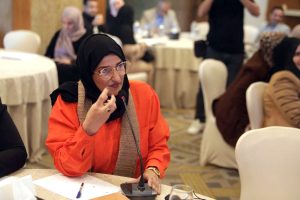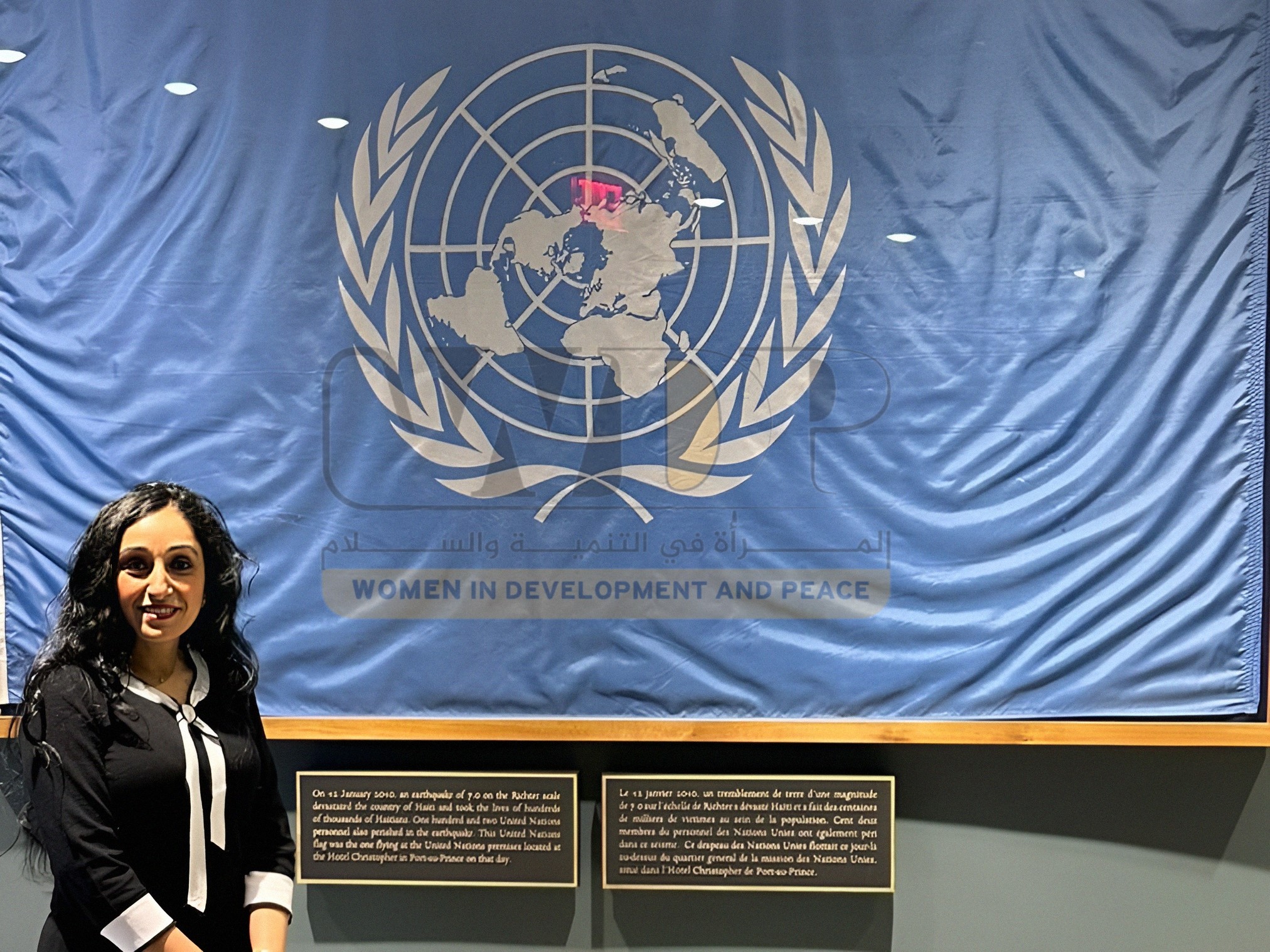Women in Development and Peace – Ahmed Bajoaim
In the complex circumstances that the country is experiencing, there are many difficulties in various fields faced by women in Yemen, and the field of diplomatic work is no exception, whether inside or outside Yemen. With the increase in conflicts and the absence of stability, the task of women entering this field becomes difficult to achieve. However, some Yemeni women have been characterized by strength and courage and have been able to achieve their desired goal in the field of diplomatic work with determination, by overcoming the many difficulties left by the ongoing conflict in the country since the beginning of 2015.
Women have been able to enter the field of diplomacy from its widest doors, and have held important positions in ministries, embassies, consulates, and other sectors related to diplomatic work. The success of Yemeni women in diplomatic work has inspired many girls and created a passion for them to enter this field, as the number of successful female models increases, girls have the motivation and encouragement to embark on this career path.
The issue of women’s participation in diplomatic work is one of the most important issues that are still being discussed on the international scene, especially in light of the global trend towards empowering women in various fields, and how to face the most prominent challenges facing them, which is the view of diplomatic work as a masculine profession, the absence of support, and bias against women in some diplomatic institutions.
In this report, we will shed light on the conditions suffered by Yemeni women engaged in diplomatic work, and the most important challenges they face in diplomatic work facilities. We will also focus on the conditions of new women in diplomatic work who suffer from difficulty in adapting to the diplomatic work environment, especially in light of the prevailing masculine culture in some institutions, and search for possible solutions that contribute to improving their professional conditions.
Women’s Status in Diplomatic Institutions
 Tasabeeh Al-Harimi, an employee of a human rights organization in Sana’a, explains the importance of involving women in diplomatic work, whether in embassies or other diplomatic facilities. However, society still views diplomatic work as an exclusive profession for men, which hinders women’s opportunities to enter this field easily, and if there are women in diplomatic positions, their numbers will be small, despite this, they achieve a qualitative shift and a major change in diplomatic work.
Tasabeeh Al-Harimi, an employee of a human rights organization in Sana’a, explains the importance of involving women in diplomatic work, whether in embassies or other diplomatic facilities. However, society still views diplomatic work as an exclusive profession for men, which hinders women’s opportunities to enter this field easily, and if there are women in diplomatic positions, their numbers will be small, despite this, they achieve a qualitative shift and a major change in diplomatic work.
She explained that women in diplomatic work have the ability to shed light on the most important, pivotal, and qualitative issues in society. They can delve into topics more deeply and fairly, benefitting society as a whole. Women’s participation in diplomatic facilities gives positive indications for peacemaking processes, given their ability to foster peace.
Al-Harimi, who is a participant in the “Arab League Simulation Conference” held in Hadhramaut Governorate, which is a realistic training in the field of diplomacy, pointed out that Yemeni women in diplomatic facilities face many difficulties and challenges that hinder the role they adopt or struggle to reach. They include demanding radical solutions to women’s issues such as job discrimination, gender bias, and lack of job opportunities. Furthermore, women’s voices in the diplomatic facility may be subject to interference and opposition, impacting many concepts and issues related to women, in addition to the existence of exceptions that distinguish men from women in that facility, as a result of the unstable security and political situation in Yemen.
Moreover, Dr. Sara Bamahdi, a participant in the United Nations Simulation Conference as a member of the UNESCO organization, which was implemented in 2021 in Hadaramaut, explained that it is difficult to give an accurate and clear description of the status of women in diplomatic facilities. There are no clear achievements regarding women and their role in highlighting women’s issues in this field. Women have received training and positions in local authorities, but in the field of diplomacy, the matter is difficult; because the official authorities – if the expression is correct – do not want to promote women in this field on an ongoing basis. Despite the presence of many women in embassies and ministries, it remains weak compared to men.
Sara Bamahdi added that it is difficult, even now, to find a prominent female diplomat, despite her ability to be an inspiring role model for many women, in working in diplomatic facilities internally or externally, which enhances the voice of Yemeni women and addresses their suffering. However, the Yemeni crisis, which has lasted more than nine years, has caused great suffering in various sectors, and perhaps the role of women in the diplomatic field is one of these sufferings, which in turn affected the presence of women in important diplomatic facilities, and reduced their opportunities for effective participation in this field.
She also pointed out that the presence of Yemeni women in international organizations is an exception to the rule of their absence from important diplomatic facilities. Women have achieved a qualitative shift in terms of developing expertise and capabilities in these organizations and have proven their ability to make a positive change in various fields.
 In a related context, human rights activist Bushra Al-Saadi, a trainee in the diplomatic field, stated that the status of women in diplomatic facilities requires great efforts to achieve fair representation between the sexes in official institutions. Ensuring women’s representation in diplomatic decisions reflects the diversity of society and its ability to address all societal issues, as women’s voices have a substantial societal impact. In addition, the importance of women’s presence in diplomatic facilities contributes to promoting women’s issues and their rights in local and global communities. The presence of women empowers them and combats discrimination and gender-based violence.
In a related context, human rights activist Bushra Al-Saadi, a trainee in the diplomatic field, stated that the status of women in diplomatic facilities requires great efforts to achieve fair representation between the sexes in official institutions. Ensuring women’s representation in diplomatic decisions reflects the diversity of society and its ability to address all societal issues, as women’s voices have a substantial societal impact. In addition, the importance of women’s presence in diplomatic facilities contributes to promoting women’s issues and their rights in local and global communities. The presence of women empowers them and combats discrimination and gender-based violence.
Al-Saadi continued that the presence of women diplomats in facilities, such as ministries, embassies, and consulates, contributes to encouraging young women to take advanced steps in their careers and enhances their political, rights-based, and societal culture. Additionally, women diplomats are an important part of strengthening international efforts to achieve the peace-building process, as the presence of diverse and multiple perspectives will contribute significantly to finding better and more inclusive solutions to global and Yemeni challenges in particular.
Diplomacy & Society
Tasabeeh Al-Harimi says: “The model of the Arab League University Simulation Conference held in Hadhramaut Governorate in 2022 was the beginning of my engagement in diplomatic training. It introduced me to society with my strong interest in the field of diplomatic work in the future. I’ve learned to confront societal, security, and political challenges and difficulties and transform those challenges into strengths that enable us to move towards achieving the goal. Women in Yemeni society face a different view of the world, as local society in most Yemeni governorates is still dominated by customs, traditions, and ideological thinking that does not believe in the importance of its role in the diplomatic corps.
She also stressed that society’s view was not a real criterion for a woman’s success or failure in any field she enters, as Yemeni women have the ability to change that narrow view of them, whether within institutions working in the diplomatic field or outside it, by continuing to achieve achievements in human rights, humanitarian, and political work related to diplomatic work, which is the right path in drawing the road to success and distinction in the diplomatic field.
For her part, Bushra Al-Saadi explained that Yemeni women engaged in diplomatic work face cultural and social challenges, as the societal view is often sharp towards working women, especially in institutions where men are abundant. This has been overcome in many stages in foreign societies, but in our local society, it still needs awareness and education towards the view directed at women. Additionally, women suffer from a lack of educational and professional opportunities.
She explained that these challenges can be addressed by enhancing community awareness of the importance of women’s engagement in human rights and diplomatic work, providing education and training opportunities, encouraging women’s representation, and building supportive networks.
She noted that she is one of the women engaged in diplomatic work, as she is fully aware of the impact of those challenges and difficulties that women face in diplomatic work. However, she emphasizes that it is possible to change reality and achieve significant progress by giving her the right to hold high positions in Yemeni diplomacy and represent Yemen in international conferences and forums, especially at this exceptional stage that Yemen is going through, and work on formulating policies and making important decisions.
She added that women believe in their ability to continue learning and developing their personal and diplomatic skills if opportunities are available for that, which will help in achieving development in the diplomatic field. Additionally, joint cooperation with all relevant parties to build supportive networks that provide opportunities for the professional development of Yemeni women to enable them to become leaders in various fields, especially the diplomatic field.
Solutions
Tasabeeh Al-Harimi mentioned several treatments to enhance women’s presence in diplomatic work. Foremost among these is raising community awareness about the vital role women play across different sectors – developmental, rights-based, and service sectors – to achieve comprehensive development that improves the country’s status at the global level. Moreover, both the public and private sectors should show interest in women involved in the diplomatic corps by providing training and rehabilitation grants, whether at the local or international level. Strengthening ties between women and international organizations specializing in the field of developing diplomatic work is also crucial to enhance their expertise in this field. Furthermore, opportunities for training in embassies, ministries, and consulates are essential to raise skill capabilities on the ground and effective participation in negotiation and peacebuilding processes.
Al-Harimi also points to the importance of involving women working in the diplomatic corps in training activities to benefit from their practical experiences and learn about the challenges they face, such as the “United Nations and Arab League Simulation Conference”, which was implemented for the first time in Yemen. The participants benefited greatly from this conference in terms of practical practice and understanding the policies of the countries they represent in the conference, and how they deal with thorny issues, how to raise and discuss them, and also address them, and the process of voting on development projects, and working to expand networks of relationships; whether with participants, trainers, or donors and stakeholders.
Dr. Sara Bamahdi stated that the treatments lie in raising the desires of official entities to promote women to diplomatic positions, which is a legitimate right for women to work in this field, given their qualified abilities and long experience in institutional and negotiation work. Providing training and rehabilitation factors for women is essential to enhance their capabilities in diplomatic work. Organizations and sectors that represent women, such as the National Committee for Women and the Yemeni Women’s Union, should establish agreements and partnerships with international organizations, ministries, and embassies to work on qualifying and training women in the field of diplomatic work and highlighting their real role.
Bushra Al-Saadi dealt with some points to enhance the role of women in diplomatic facilities, the most important of which are: increasing women’s representation in ministries, embassies, and consulates, encouraging women to obtain leadership positions within diplomatic facilities, supporting professional networks, and expanding their scope of work to include Yemeni governorates, and working on community awareness of women’s rights, and the importance of their role in society, and changing the cultural stereotype of society.
She added that the participation of Yemeni women in diplomatic work is one of the most important indicators of their empowerment in various fields; through their participation in local and international discussions and initiatives, which have greatly helped in enhancing their diplomatic role, and supporting gender equality in this field.
Bushra Al-Saadi’s participation in the Arab League Simulation Conference represented an honorable model for Yemeni women. Her participation in the conference helped to develop her and build her capacities in negotiation processes, enhancing her expertise, and building self-confidence, which is one of the most prominent positive points that the participants came out within the conference, and creating a clear vision for future work in the diplomatic field; whether as an ambassador or foreign minister. It also helped her expand her social networks in the field of diplomatic work, by communicating with diplomats and experts in this field, to gain new experiences.
At the end of the report, joint work is required to improve the conditions of Yemeni women working in the diplomatic corps within the facilities first, and to enhance their empowerment and encourage them to engage more in international affairs, due to their great role in decision-making positions; to advance Yemen’s status for the better.

